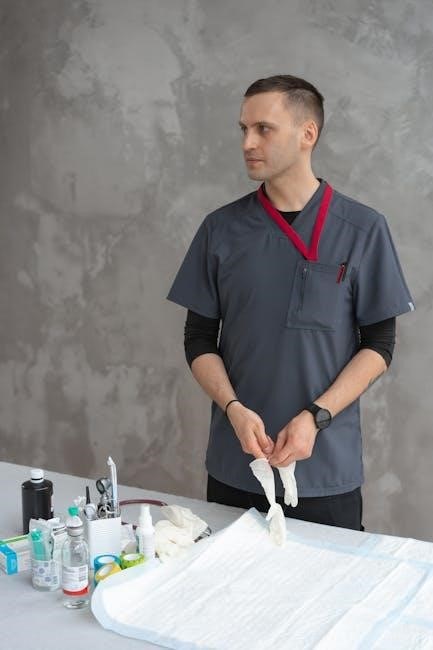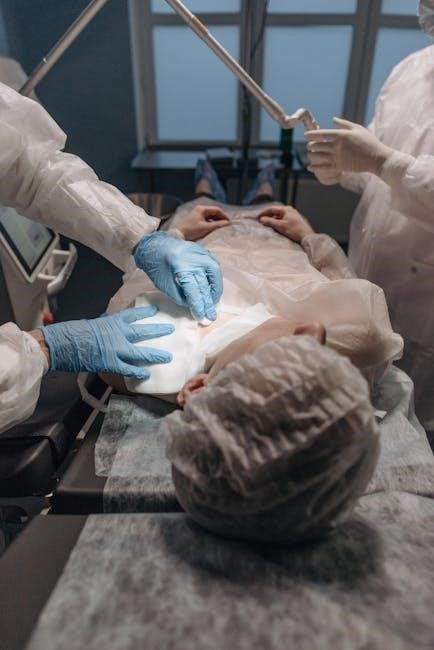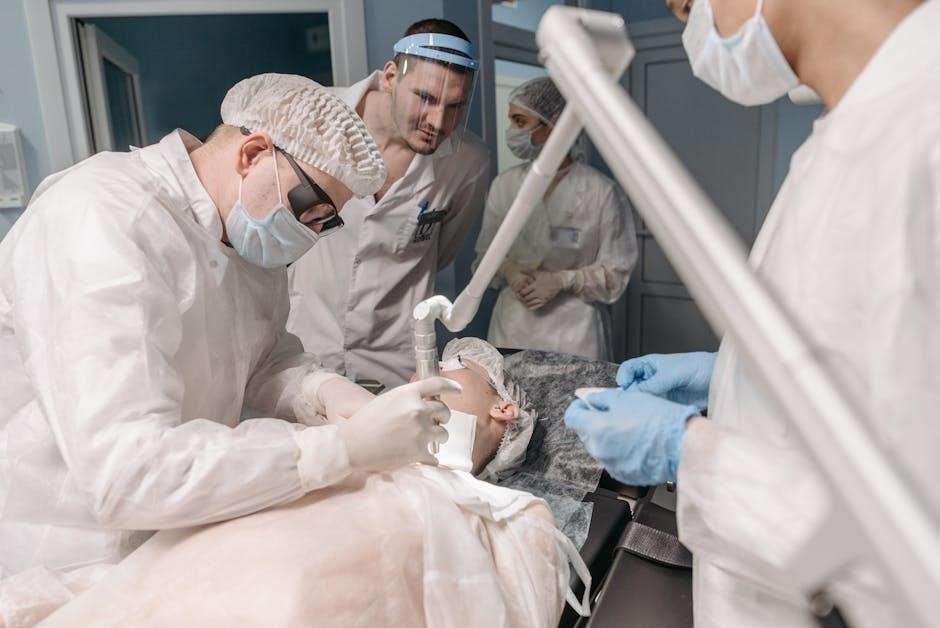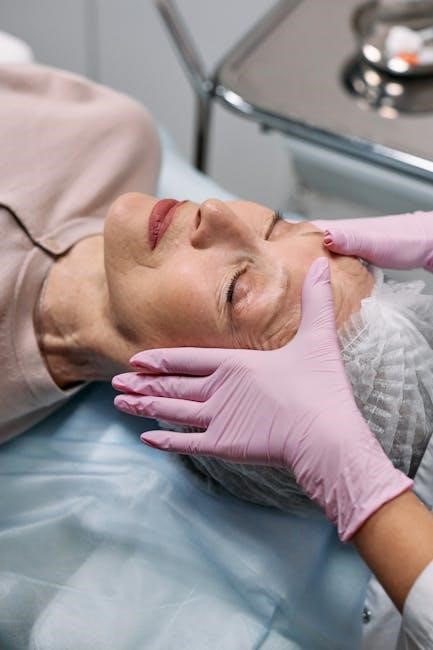A comprehensive resource for nursing students and professionals, this question bank offers multiple-choice and short-answer questions, focusing on clinical judgment, systems thinking, and evidence-based care in medical-surgical nursing.
Importance of Medical Surgical Nursing Question Banks
These question banks enhance critical thinking and understanding of key concepts, serving as vital tools for both nursing education and successful exam preparation in medical-surgical nursing.
Role in Nursing Education
Medical surgical nursing question banks play a vital role in nursing education by providing students with a structured and comprehensive way to assess their knowledge. These resources include multiple-choice and short-answer questions that cover a wide range of topics, such as wound healing, oncology, and genitourinary problems. By practicing with these questions, students can identify gaps in their understanding and reinforce key concepts. The question banks are designed to align with standard nursing curricula, ensuring that students are well-prepared for exams and clinical practice. Additionally, they help develop critical thinking and problem-solving skills, which are essential for patient care. Many question banks also include detailed explanations for correct and incorrect answers, serving as a valuable self-study tool. Overall, they enhance skill development and clinical judgment, making them an indispensable resource for nursing education and professional growth.
Preparation for Licensing Exams
Medical surgical nursing question banks are invaluable for preparing for licensing exams, such as the NCLEX-RN or other professional certifications. They provide a simulated exam environment, allowing candidates to practice and assess their readiness. The question banks include multiple-choice and short-answer questions, mirroring the format of licensing exams. They cover critical areas like wound healing, oncology, genitourinary problems, and cardiovascular nursing, ensuring a comprehensive review of essential topics. Regular practice with these questions enhances clinical judgment, time management, and problem-solving skills. Additionally, the detailed explanations for correct and incorrect answers help clarify concepts and improve understanding. Many resources, such as the 10th Edition Ignatavicius test bank, are specifically designed to align with exam content, making them a reliable tool for success. By utilizing these question banks, nursing graduates can confidently prepare for their licensing exams and achieve optimal results.

Types of Questions in the Question Bank
The question bank includes multiple-choice questions (MCQs) and short-answer questions, designed to assess knowledge and understanding of medical-surgical nursing concepts. MCQs test factual recall, while short-answer questions require detailed explanations.
Multiple-Choice Questions
Multiple-choice questions (MCQs) are a cornerstone of the medical surgical nursing question bank. These questions are designed to evaluate a student’s ability to apply theoretical knowledge to clinical scenarios. Each MCQ typically presents a stem, which includes a question or statement, followed by several options, with only one correct answer. This format allows for efficient assessment of a wide range of topics, from basic concepts to complex care strategies. The MCQs in the question bank cover various aspects of medical-surgical nursing, including wound healing, oncology, genitourinary issues, cardiovascular care, and respiratory nursing. They are particularly useful for preparing for licensing exams, such as the NCLEX-RN, as they mimic the exam format and content. By practicing with these MCQs, students can identify knowledge gaps, improve critical thinking, and enhance their test-taking skills. Regular use of MCQs helps build confidence and ensures a solid understanding of nursing principles and practices.
Short Answer Questions
Short answer questions in the medical surgical nursing question bank are designed to assess a student’s ability to provide concise, accurate, and relevant responses to clinical scenarios. These questions often require students to describe concepts, explain processes, or outline nursing interventions. For example, questions may ask students to list the types of kidney stones, explain the nursing management of a patient with a urinary tract infection, or describe the complications of benign prostatic hyperplasia (BPH). This format allows for a deeper exploration of topics compared to multiple-choice questions, while still maintaining clarity and focus. Short answer questions are particularly useful for evaluating a student’s understanding of complex topics, such as wound healing, genitourinary problems, and oncology nursing. They encourage critical thinking and the ability to articulate knowledge effectively, which are essential skills for nursing practice. Regular practice with short answer questions helps students prepare for exams and develop clear, organized communication skills.

Topics Covered in the Question Bank
The question bank covers wound healing, oncology nursing, genitourinary problems, cardiovascular, and respiratory nursing, providing a broad range of clinical scenarios and care strategies.
Wound Healing and Management
This section focuses on wound assessment, classification, and evidence-based care strategies. Questions cover types of wounds, such as surgical, traumatic, or pressure ulcers, and their management. Topics include debridement, dressing techniques, and infection control. Students are also tested on nursing interventions to promote healing, prevent complications, and improve patient outcomes. The content emphasizes clinical judgment in wound care, preparing nurses for real-world scenarios.
Oncology Nursing
This section covers essential aspects of oncology nursing, including cancer types, assessment, and treatment modalities. Questions address symptom management, chemotherapy administration, and radiation therapy. Emphasis is placed on patient education, pain management, and psychosocial support. The content also explores nursing care plans for patients with various cancers, such as breast, lung, and colorectal cancer. Critical thinking is assessed through clinical scenarios, ensuring nurses can provide evidence-based, compassionate care. Additionally, the questions cover side effects of cancer treatments and strategies to improve patient outcomes. This section is vital for nurses working in oncology settings, helping them develop expertise in caring for patients with complex needs.
Genitourinary Problems
This section focuses on nursing care for patients with genitourinary disorders, including kidney stones, urinary tract infections (UTIs), and prostate issues like Benign Prostatic Hyperplasia (BPH). Questions cover the causes, symptoms, and nursing management of these conditions. For kidney stones, topics include types of renal calculi and their management. UTI questions address prevention strategies and patient education. Nursing interventions for BPH, such as surgical and non-surgical treatments, are also highlighted. Additionally, the section includes questions on complications like hydronephrosis and its implications for renal function. Short-answer questions require students to list types of renal calculi and explain their characteristics. This section is essential for developing a strong foundation in caring for patients with genitourinary issues, ensuring nurses can provide evidence-based, patient-centered care in both acute and chronic settings. The questions emphasize critical thinking and application of nursing knowledge.
Cardiovascular Nursing
This section focuses on the care of patients with cardiovascular conditions, such as heart failure, coronary artery disease, arrhythmias, and hypertension. Questions address nursing assessments, including interpreting ECGs and monitoring blood pressure, as well as interventions like administering cardiovascular medications (e.g., beta-blockers, ACE inhibitors) and educating patients on lifestyle modifications. The content also covers postoperative care for cardiac surgeries and managing complications like myocardial infarction or cardiac dysrhythmias. Multiple-choice questions test knowledge of drug therapies and their effects, while short-answer questions require detailed care plans for patients with conditions like hypertension or heart failure. Emphasis is placed on evidence-based practices and critical thinking in providing holistic care for cardiovascular patients. This section is vital for nursing students to master the complexities of cardiovascular nursing, ensuring they are prepared to deliver high-quality patient care in both acute and chronic settings.
Respiratory Nursing
This section covers the care of patients with respiratory conditions, such as chronic obstructive pulmonary disease (COPD), asthma, pneumonia, and acute respiratory distress syndrome (ARDS). Questions focus on nursing assessments, including interpreting arterial blood gas (ABG) results and monitoring oxygen saturation levels. Interventions such as oxygen therapy, mechanical ventilation, and medication administration (e.g., bronchodilators, corticosteroids) are emphasized. Multiple-choice questions test knowledge of respiratory medications, inhalation therapies, and chest physiotherapy techniques. Short-answer questions require detailed care plans for patients with conditions like COPD or asthma, including strategies to improve lung function and reduce exacerbations. The content also addresses postoperative respiratory care and the management of complications like pulmonary embolism. The questions are designed to enhance critical thinking and evidence-based practice in respiratory nursing, preparing students to provide effective care for patients with diverse respiratory needs in both acute and chronic settings.

Recommended Resources for Question Banks
Popular resources include textbooks like Medical Surgical Nursing by Ignatavicius and Lewis’s Medical Surgical Nursing. Online platforms offer free PDF downloads, practice exams, and multiple-choice questions for exam preparation and skill enhancement.
Textbooks and Publications
Textbooks and publications are essential resources for medical surgical nursing question banks. The 10th Edition of Medical Surgical Nursing by Ignatavicius includes a test bank with multiple-choice and multiple-response questions, focusing on clinical judgment and evidence-based care. Similarly, Lewis’s Medical Surgical Nursing (11th Edition) offers a professional nursing test bank with questions on systems thinking and patient care. Institutions like RGUHS provide Medical Surgical Nursing Question Banks and blueprints in PDF format, covering topics such as wound healing, oncology, and genitourinary problems. These resources are designed to assess understanding of critical nursing concepts and practices. Many publications are available for free download, offering practice exams, short-answer questions, and detailed solutions. They serve as invaluable tools for nursing students and professionals preparing for licensing exams or seeking to enhance their clinical skills.
Online Platforms and Websites
Online platforms and websites provide accessible and convenient resources for medical surgical nursing question banks. Websites like Studylib and Nursing MCQ Quiz offer comprehensive question banks with multiple-choice and short-answer questions, ideal for exam preparation. Many platforms provide free downloadable PDFs, such as the Medical Surgical Nursing MCQ Quiz, which includes objective questions with detailed solutions. These resources cover a wide range of topics, including wound healing, oncology, and genitourinary problems. Additionally, some websites offer interactive test series for competitive exams like RRB Nursing Officer and NORCET. Online platforms also allow users to take mock tests, helping them assess their knowledge and improve time management. With the convenience of online access, nursing students and professionals can efficiently prepare for licensing exams and enhance their clinical skills. These resources are often updated and aligned with current nursing practices, making them reliable tools for education and professional development.

Effective Use of Question Banks for Exam Preparation
Utilize question banks to simulate real exams, improving time management and identifying weak areas. Regular practice with diverse questions enhances clinical judgment and reinforces key concepts, ensuring comprehensive exam readiness and confidence.

Study Strategies
Effective study strategies using a medical-surgical nursing question bank involve prioritizing high-weight topics and practicing consistently. Start by identifying weak areas through self-assessment and focus on improving them. Use active recall by answering questions without notes, enhancing long-term retention. Incorporate spaced repetition, reviewing concepts at increasing intervals to reinforce memory. Organize study sessions into manageable chunks, ensuring a balanced approach to diverse topics. Utilize the question bank to simulate real exams, improving time management and reducing anxiety. Regularly review explanations for both correct and incorrect answers to deepen understanding. Collaborate with peers or join study groups to discuss challenging questions and gain new insights. Track progress to monitor improvement and adjust study plans accordingly. By combining these strategies, learners can maximize the benefits of the question bank and achieve exam success.
Time Management Techniques
Effective time management is crucial when using a medical-surgical nursing question bank for exam preparation. Start by allocating specific time slots for practice sessions, ensuring consistency. Use a timer during practice to simulate real exam conditions, helping to build speed and accuracy. Prioritize questions based on difficulty or relevance, focusing on high-weight topics first. Review explanations immediately after answering to maximize learning efficiency. Implement the Pomodoro Technique—25 minutes of focused practice followed by a 5-minute break—to maintain concentration. Avoid spending too much time on a single question; instead, flag it for later review. Track your progress and adjust your schedule to address weaker areas. By managing time wisely, you can cover more content, improve decision-making under pressure, and enhance overall performance. These techniques ensure that your preparation is both productive and aligned with the demands of the exam.

Sample Questions from the Question Bank
The question bank includes multiple-choice and short-answer questions. Examples: “Describe the types of inflammation?” and “What are the priority nursing interventions for a patient with a urinary tract infection?”
Multiple-Choice Examples
Multiple-choice questions in the question bank are designed to assess critical thinking and application of knowledge. Examples include:
- “What is the primary cause of pressure ulcers in immobile patients?”
a) Poor nutrition
b) Inadequate fluid intake
c) Prolonged pressure on skin areas
d) Infection - “Which intervention is most effective in preventing wound infection?”
a) Applying antibiotic ointment
b) Cleaning the wound with saline solution
c) Covering the wound with a sterile dressing
d) All of the above”
These questions cover topics like wound healing, oncology, and genitourinary nursing, ensuring a broad understanding of medical-surgical concepts. They are structured to test both knowledge and the ability to apply it in clinical scenarios, making them ideal for exam preparation. Detailed explanations for correct answers are often provided, enhancing learning and retention.
Short Answer Examples
Short answer questions in the question bank require concise, detailed responses, testing in-depth knowledge and the ability to articulate nursing concepts clearly. Examples include:
- “Describe the nursing management of a patient with a urinary tract infection. Include assessment, interventions, and patient education.”
- “Explain the pathophysiology of pressure ulcers and list three evidence-based strategies for prevention.”
- “A patient with laryngeal cancer presents with difficulty swallowing. Develop a nursing care plan with three priority needs and interventions.”
These questions cover critical areas like wound healing, genitourinary issues, and oncology, ensuring a comprehensive understanding of medical-surgical nursing. They allow students to demonstrate their ability to think critically and apply knowledge in real-world clinical scenarios, making them invaluable for exam preparation and professional development. The focus is on clarity, accuracy, and the ability to prioritize patient care effectively.



